Adrian Mucalov
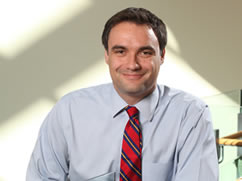
It’s a long way from Queensville, ON, population 630, to London, England, but Adrian Mucalov, BCom’01, has settled in quite nicely. He’s visited more than 60 countries, including many in the developing world, so adjusting to London, as an Associate at Actis, an emerging markets private equity fund, wasn’t difficult. Years earlier, moving to the big city of Kingston from his home town was more of a challenge.
“My first year at Queen’s was a bit overwhelming at first,” Adrian explains. “I grew up in a very rural community an hour north of Toronto, but I knew that Queen’s offered amazing opportunities.” His extracurricular activities covered the spectrum from serving as Frosh Week Chief Boss in his second year to a term on Queen’s Senate in his fourth.
If Queen’s was a transformative experience, his international exchange term at Herstmonceux Castle was life-altering. “It really broadened my horizons,” he recalls. “The class trips offered tremendous opportunities for experiential learning. And I visited a lot of my classmates who were on exchange in other European cities. That’s when I really picked up the travel bug.”
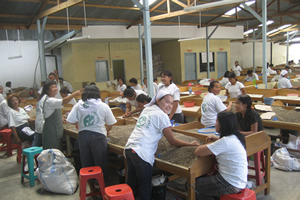 A UN-partner coffee company in Indonesia Adrian’s first job post-graduation was with the Toronto office of international consulting firm Monitor Group’s strategy consulting group. While at Monitor, he completed his CFA, and in 2004 volunteered for an international assignment in Korea. “It was an eye-opening experience to see how Korea had transformed itself from a war-ravaged, devastated country as recently as the 1950s to become an economic powerhouse. I remember thinking, if Korea can do it, why can’t other developing countries?”
A UN-partner coffee company in Indonesia Adrian’s first job post-graduation was with the Toronto office of international consulting firm Monitor Group’s strategy consulting group. While at Monitor, he completed his CFA, and in 2004 volunteered for an international assignment in Korea. “It was an eye-opening experience to see how Korea had transformed itself from a war-ravaged, devastated country as recently as the 1950s to become an economic powerhouse. I remember thinking, if Korea can do it, why can’t other developing countries?”
His interest shifted from strictly business to the business of international development when he left Monitor for a position at CARE International, an international NGO dedicated to ending poverty. A project in Africa reinforced what he’d seen in Korea. “I discovered that Zambia’s GDP had equalled Korea’s in 1960. The contrast between how Korea had grown and prospered while Zambia had fallen behind was a powerful lesson. I found that once I started thinking about how economic growth can transform societies, it was difficult to think of anything else.”
His path could have taken several directions at this point. Adrian realized that in order to make a difference he needed a deeper knowledge of international development and business management. Harvard University’s joint MBA/Master of Public Administration in International Development provided both.
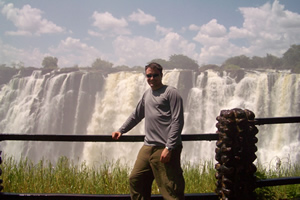 At Victoria Falls in Zambia Adrian found that Harvard offered a multitude of experiences that included an international network of classmates scattered throughout the globe. “Between my Harvard and Queen’s friends, I have an unlimited supply of couches to crash on around the world,” he laughs.
At Victoria Falls in Zambia Adrian found that Harvard offered a multitude of experiences that included an international network of classmates scattered throughout the globe. “Between my Harvard and Queen’s friends, I have an unlimited supply of couches to crash on around the world,” he laughs.
He is quick to praise the depth and breadth of both his Harvard and Queen’s degrees and notes that his Commerce studies prepared him well for his post-graduate work. “Some of my Harvard courses were on a par with similar ones from my Commerce days. And both Harvard and Queen’s excel at instilling class spirit.”
Harvard’s summer internship program was an added bonus. Adrian’s summer jobs offered an eclectic mix of experiences, from working as a Let’s Go Europe contributor (to the chapters on Russia, Ukraine, Romania, and Bulgaria) to stints at the United Nations in Indonesia and at the European Bank for Reconstruction and Development, in London.
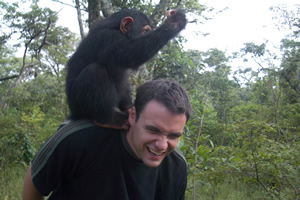 At a chimpanzee orphanage in Zambia
At a chimpanzee orphanage in Zambia
The difference these investments would make in the lives of people in developing countries was priceless.
Upon graduation, he had both the tools and the commitment to work on business opportunities in the developing world. The question was: how best to apply them? The answer came during an on-campus recruiting session with Actis, a London, UK-based private equity fund that operates in the world’s emerging markets and manages a fund of $US 4.8 billion (2010 figures.) Its core operating principle is to help the private sector make a positive contribution to society. Actis calls this ‘the positive power of capital.’
And there it was – a company with an ethos Adrian could ascribe to, a purpose higher than just making a buck. The bucks to be made would benefit investors, sure, but the difference these investments would make in the lives of people in developing countries was priceless.
Adrian accepted the position offered, moved to London to join the Actis infrastructure team, and hasn’t looked back since. He travels frequently and is currently engrossed in an electricity, infrastructure project in Uganda. Only 8% of Ugandan residences and businesses have electricity, so there is a huge growth opportunity in increasing electricity capacity in this African nation. Actis helped to privatize a state-owned electricity utility and has invested millions to develop its infrastructure and expand its network. “The project involves more than installing wires and hydro poles,” Adrian explains. “It’s providing electricity to people who have never had it before. It’s training a work force, giving the local people the skills they need to be able to produce a much needed resource for their country.”
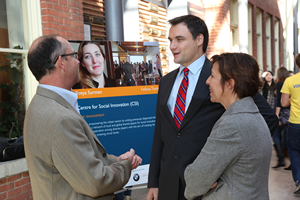 With CSR Weekend fellow panellists Célia Cruz and Nicholas Parker
With CSR Weekend fellow panellists Célia Cruz and Nicholas Parker
Adrian has an unlimited supply of couches to crash on around the world.
Adrian talked about this and more during a visit to QSB to speak to students attending the CSR / Responsible Leadership Weekend in October. He recently joined the Advisory Board of the School’s Centre for Responsible Leadership that hosted the weekend event. “It was great to be back and to see how engaged the students were in learning more about responsible leadership and exploring opportunities to contribute,” he said.
After wrapping up the CSR Weekend, Adrian spoke to a Commerce marketing class before dashing off to the airport for his flight home. The seasoned traveller packs light; no checked baggage, boarding pass in hand, another airport, another red-eye, then home. At least until the next project, and the next chance to make a difference.
